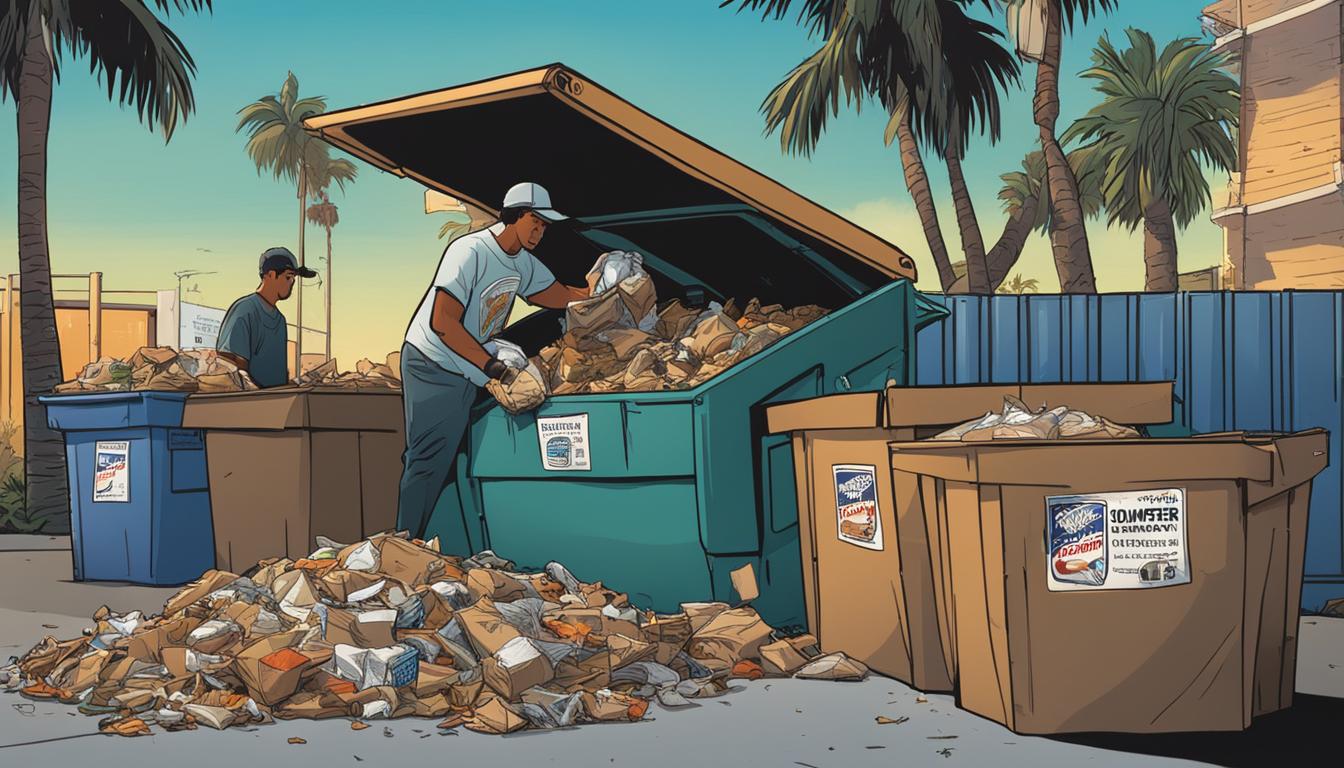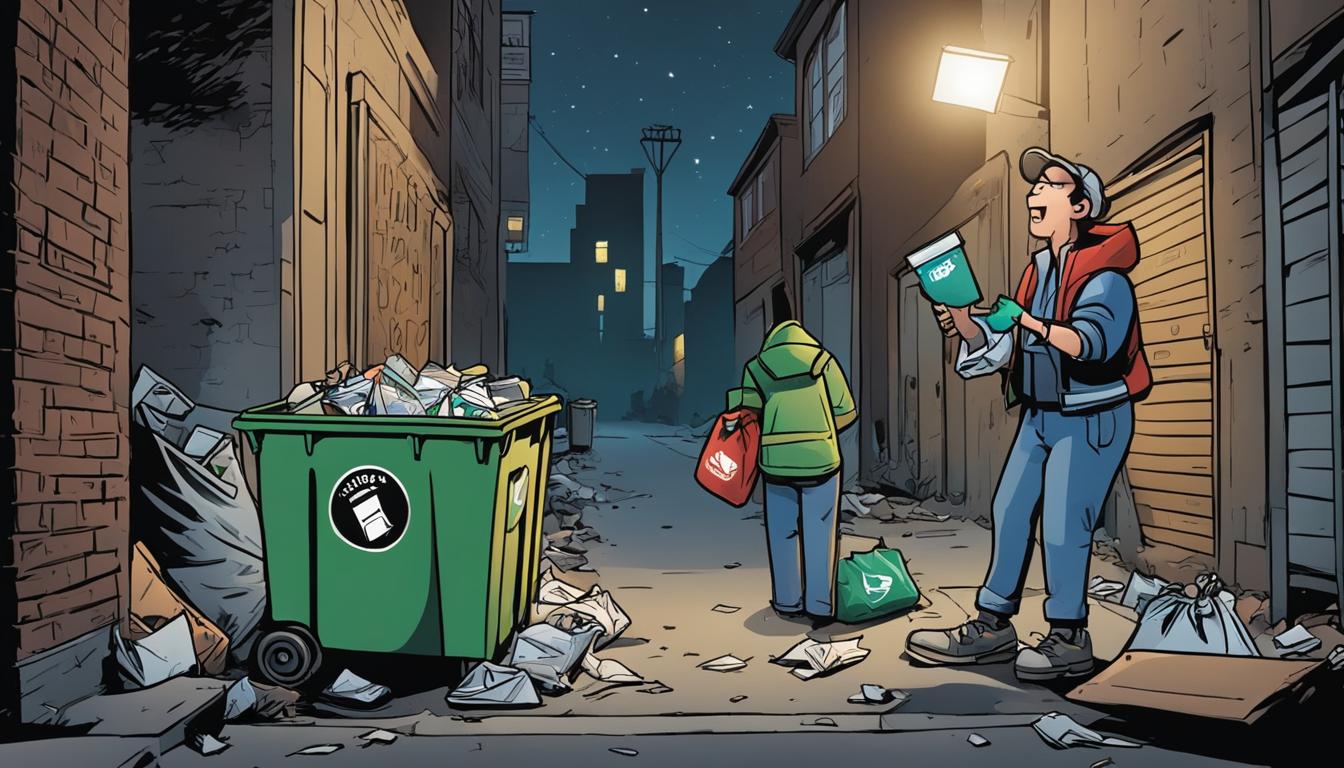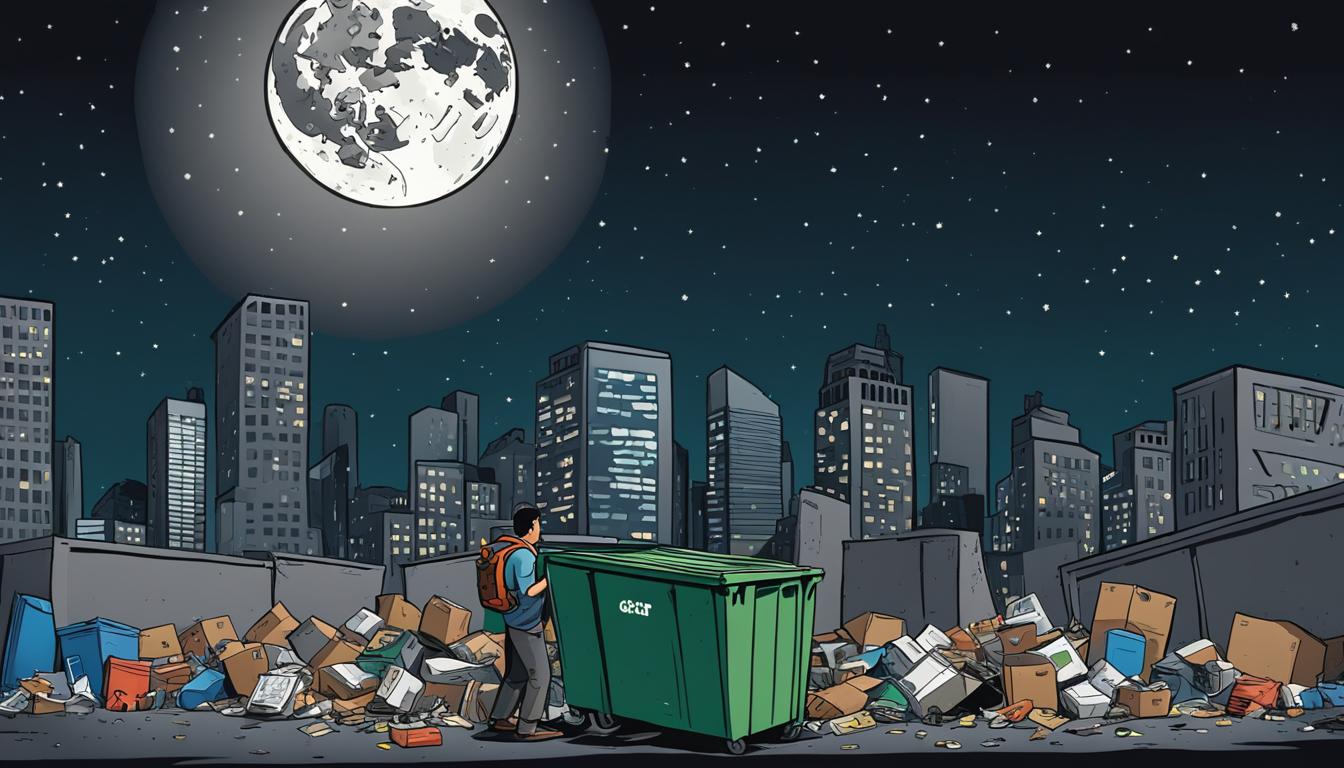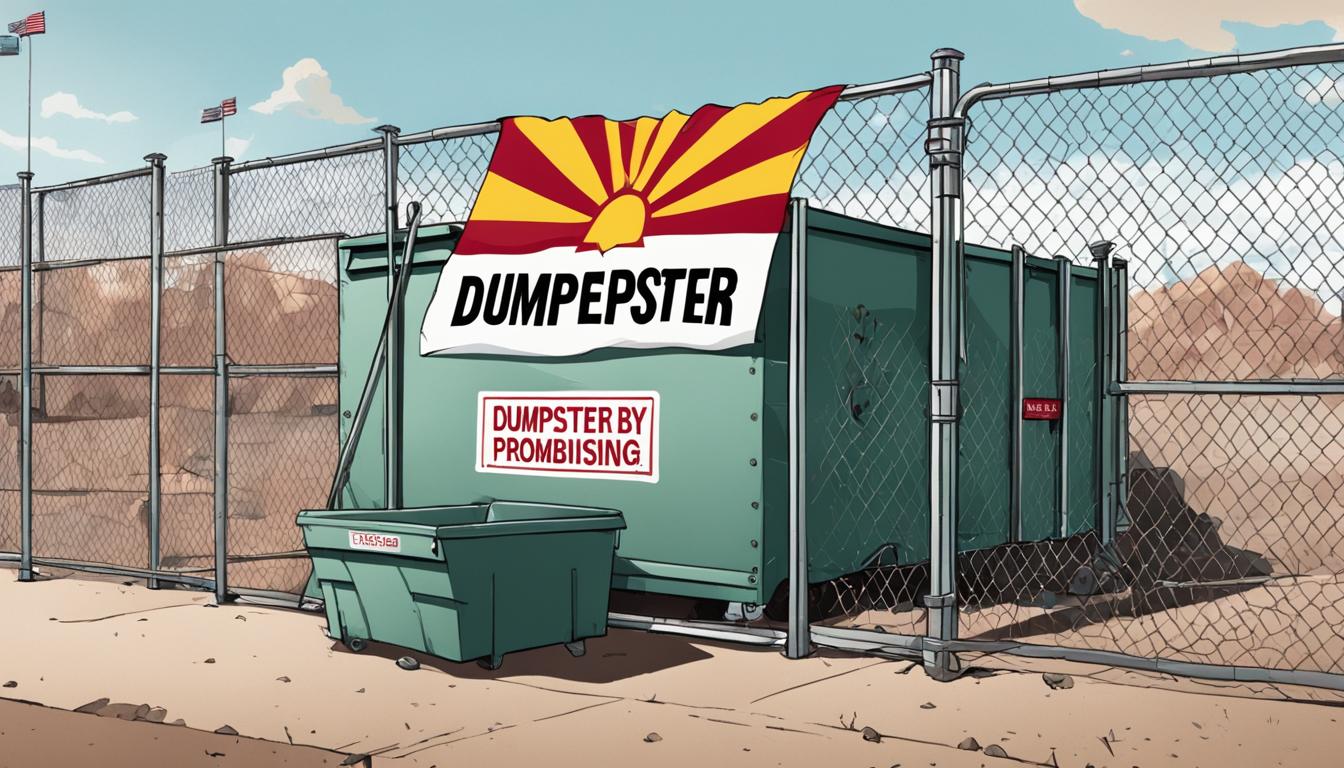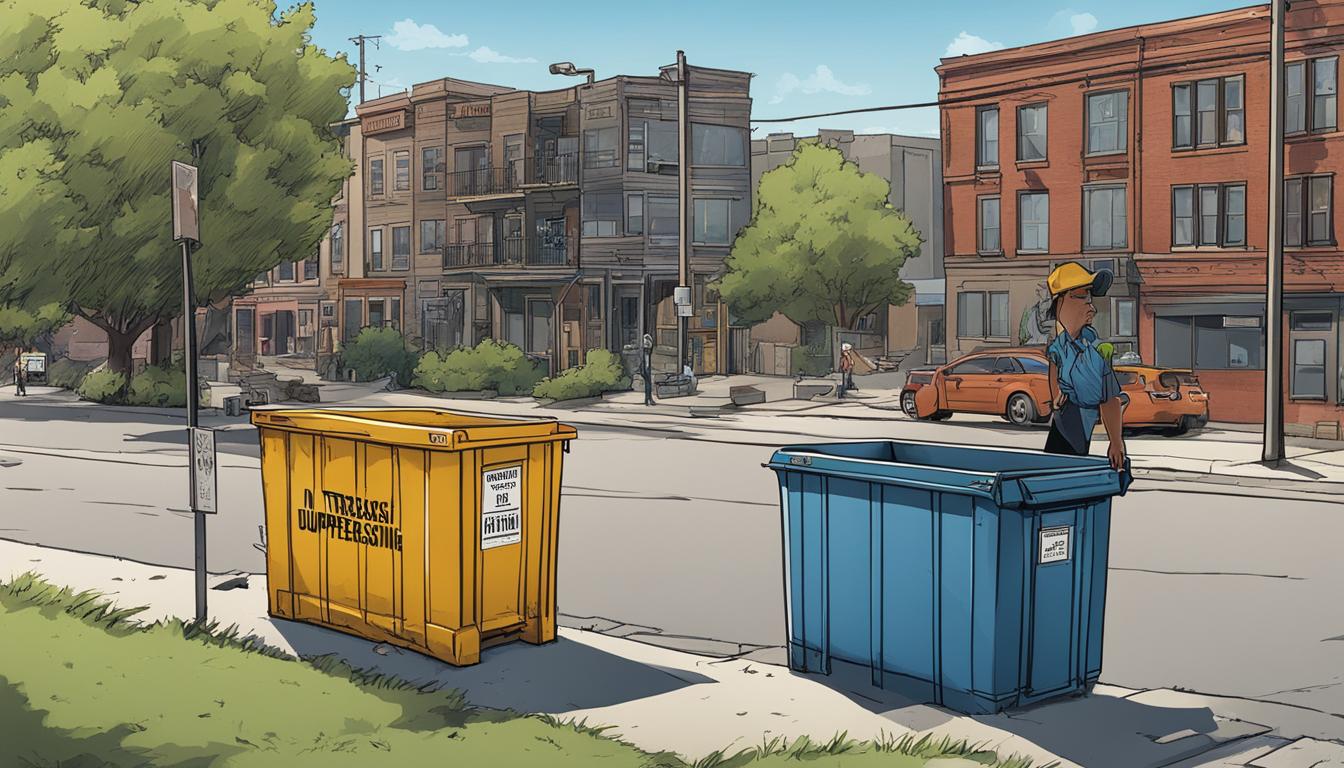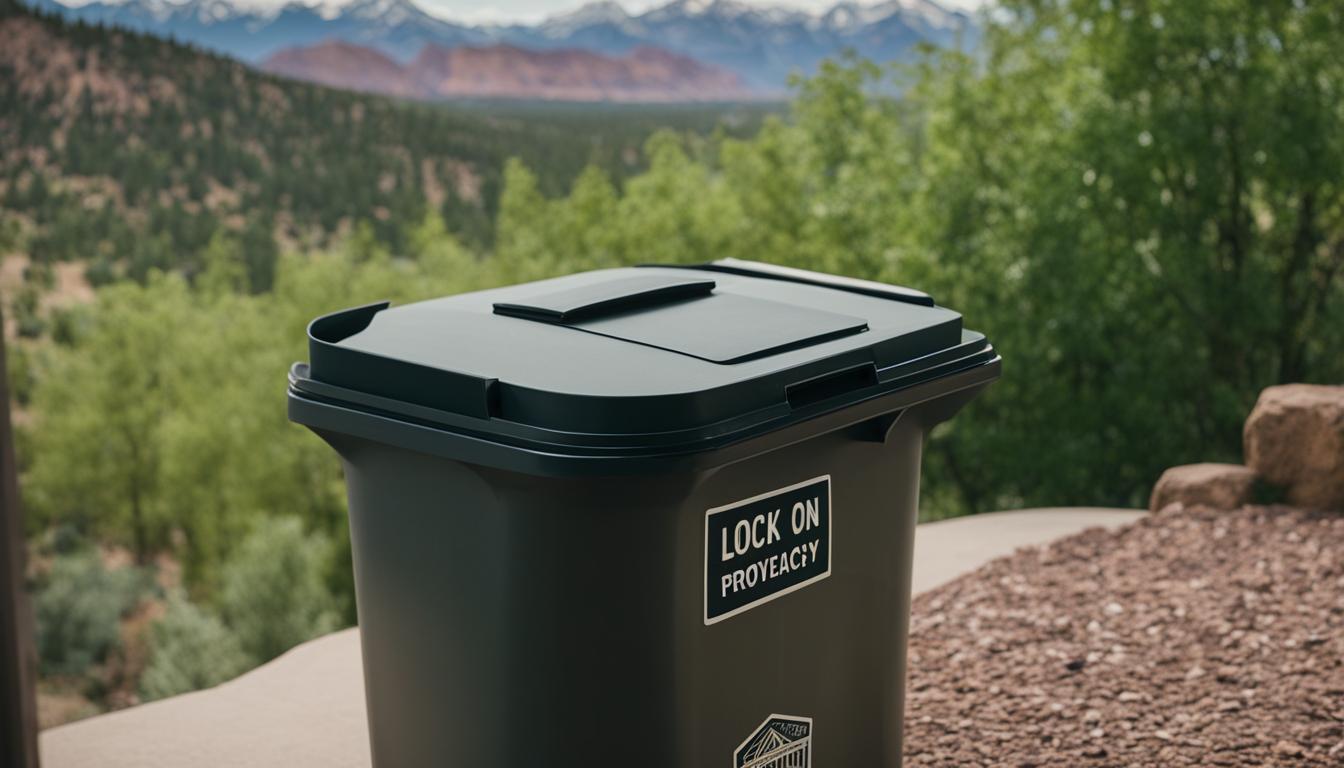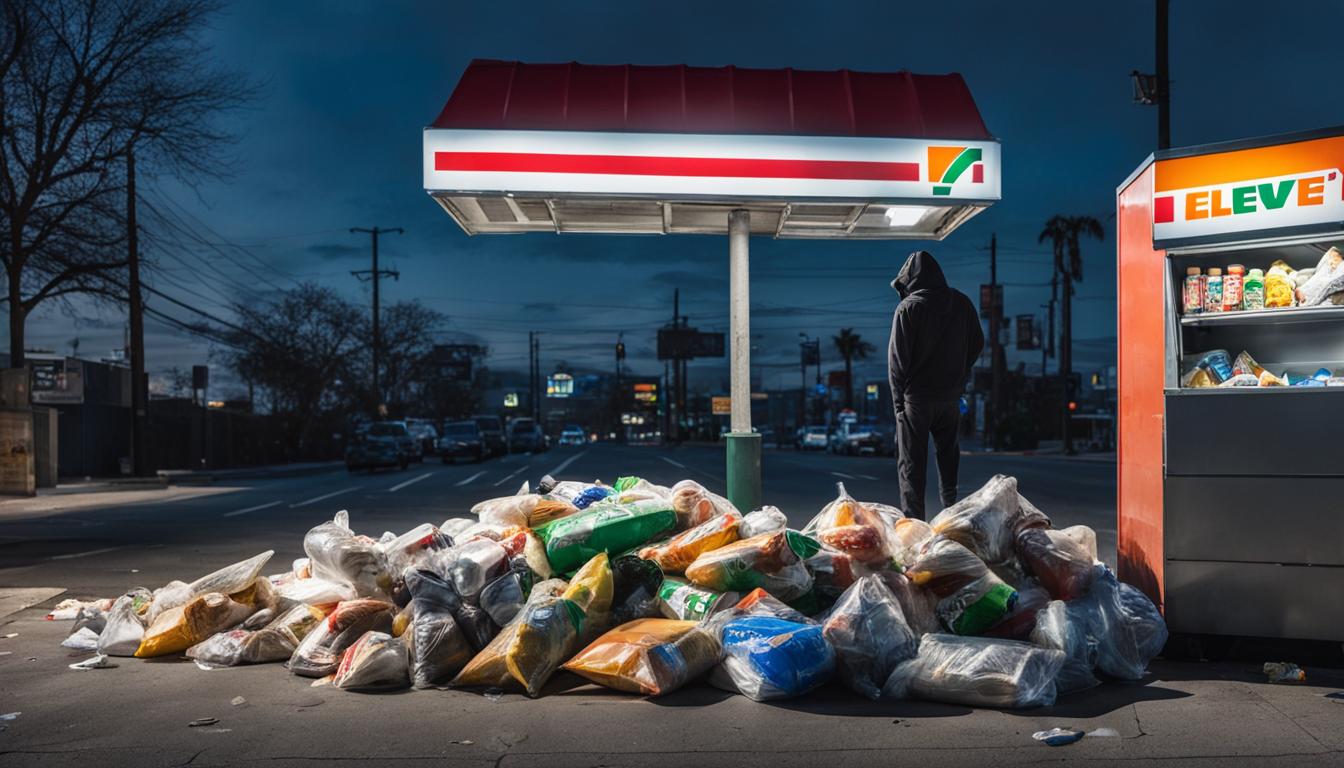Disclosure: This Post Contains Affiliate Links; We earn a commission on purchases.
Are you curious about the legality of dumpster diving in Florida? Wondering if there are any specific dumpster diving laws in the state? You’ve come to the right place! In this article, we will explore the legality of dumpster diving in Florida, the rules and regulations you need to be aware of, and provide some valuable insights to help you navigate this unique activity.
Key Takeaways:
- Dumpster diving is legal in Florida, but trespassing rules still apply.
- It is allowed in dumpsters placed in public locations, such as curbs for pickup.
- Items left in dumpsters in public locations are considered abandoned and their ownership rights are waived.
- Diving into dumpsters within private property without permission can result in charges of trespass or theft.
- Avoid diving in dumpsters that are clearly located within private residential areas.
Where to Dumpster Dive in Florida: Top 5 Spots for Success
When it comes to dumpster diving in Florida, there are plenty of locations that offer great potential for finding valuable items. Whether you’re searching for hidden treasures or looking to make some extra money, these top 5 spots are worth exploring.
1. Rich Neighborhoods
Rich neighborhoods like Fisher Island, Manalapan, Golden Beach, Boca Grande, and Sewall’s Point are known for their luxurious estates and affluent residents. These neighborhoods often discard high-end items that can be found in dumpsters. Keep an eye out for valuable furniture, electronics, and other discarded items that can be resold for a profit.
2. Construction Sites
Construction sites in Florida are a goldmine for dumpster divers. With ongoing construction projects, these sites frequently discard materials and equipment that can be salvaged. From lumber and bricks to tools and machinery, these dumpsters are a treasure trove for those looking to find valuable items with minimal effort.
3. Shopping Malls and Retail Stores
Shopping malls and retail stores are popular spots for dumpster diving in Florida. Retailers often throw away unsold merchandise, damaged goods, or outdated inventory. Dive into these dumpsters to find clothing, accessories, electronics, and other items that can be repurposed, donated, or resold.
4. Beaches
Florida’s beautiful beaches attract thousands of visitors every year, and with that comes discarded items. Beachgoers often leave behind beach toys, chairs, umbrellas, and other beach essentials. These items can be found in dumpsters near the beach access points. Consider reaching out to local beach cleaning organizations to see if they allow divers to salvage these discarded items.
5. Cosmetic Stores
Florida is home to many cosmetic stores, which often dispose of partially used or expired products. Dive into dumpsters near cosmetic stores to discover makeup, skincare products, and beauty tools that can still be used or resold. Just remember to check the expiration dates and quality of the items before using or selling them.
Dumpster Diving at Night in Florida: Tips and Considerations
While dumpster diving is a legal activity in Florida, it’s important to be cautious when diving at night. Although it may provide more privacy, diving under the cover of darkness can also come with certain risks. It’s crucial to follow some guidelines and consider the potential challenges that might arise during nighttime dives.
Dumpster diving at night tends to attract more competitors, increasing the likelihood of someone calling the police. To avoid any unnecessary trouble, it’s essential to be aware of your surroundings and exercise caution at all times. Remember that trespassing on private property is still illegal, regardless of the time of day.
Tip: To mitigate these risks, consider diving during early morning hours or shortly after sunrise. This time frame offers better visibility and reduces the chances of encountering any legal troubles.
Guidelines for Dumpster Diving at Night in Florida:
- Always ensure personal safety by wearing gloves, closed-toe shoes, and appropriate clothing to protect against sharp objects and potentially hazardous materials.
- Bring a flashlight or headlamp to adequately illuminate the area and help you navigate around the dumpsters.
- Avoid making unnecessary noise during your dive, as it may draw unwanted attention or raise suspicions.
- Respect the dumpster and the surrounding property by not leaving a mess behind. Leave the area in the same condition as you found it.
- Follow ethical diving practices and do not take items that are clearly marked for disposal or belong to someone else.
By adhering to these guidelines, you can minimize the risks associated with nighttime dumpster diving in Florida. Remember to always prioritize your safety and respect the property rights of others.
“Dumpster diving can offer valuable finds, but it’s crucial to exercise caution and follow ethical practices, especially when diving at night. Respect the property, be aware of your surroundings, and stay safe.” – Florida Dumpster Diving Association
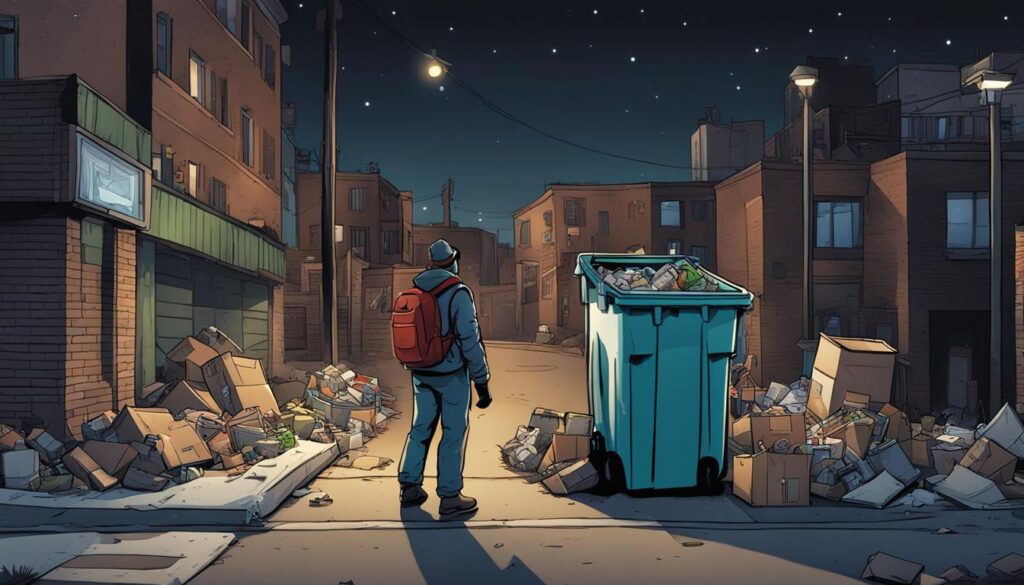
| Challenges of Nighttime Dumpster Diving in Florida | Tips to Overcome Challenges |
|---|---|
| Increased competition from other divers | Choose less crowded locations or consider going during early morning hours. |
| Potential risk of attracting attention and being reported | Be mindful of noise levels and avoid suspicious activities. |
| Difficulties in visibility and navigation | Use a flashlight or headlamp to enhance visibility and prevent accidents. |
| Risks of encountering wild animals | Stay vigilant and avoid confrontations with animals by making noise and remaining calm. |
Making Money Dumpster Diving in Florida: Potential Earnings
The earnings from dumpster diving in Florida can vary depending on the individual’s approach. Some divers focus on finding recyclable items to sell, while others search for valuable items like electronics, furniture, or books to resell online. While it is possible to make a full-time living from dumpster diving, it requires dedicated effort and time commitment.
According to a survey of 15 full-time dumpster divers in Florida, those who commit full-time hours (40+ hours per week) can potentially make up to $2800 per month.
Maximizing Profit: Tips and Strategies
To maximize your earnings while dumpster diving in Florida, consider the following tips and strategies:
- Research Profitable Items: Prioritize searching for items that have a high resale value. This could include antique pieces, brand-name electronics, or designer clothing.
- Organize and Clean Items: Presenting clean and organized items can help attract potential buyers and increase their perceived value.
- Utilize Online Marketplaces: Take advantage of online platforms such as eBay, Craigslist, or local buy/sell groups to reach a wider audience for your items.
- Build Relationships with Resellers: Connect with local resellers or thrift store owners who may be interested in purchasing your finds in bulk.
- Expand Your Knowledge: Stay informed about current trends and market demands to identify valuable items that are in demand.
By implementing these strategies and dedicating time and effort to your dumpster diving endeavors, you can increase your chances of making a lucrative income as a dumpster diver in Florida.
Understanding Dumpster Diving Laws in Florida
Dumpster diving can be an intriguing and profitable pastime for many individuals in Florida. While the activity is generally legal in the state, it is essential to navigate the legal landscape and understand the limitations, restrictions, and guidelines that apply. By being informed about Florida dumpster diving laws, divers can ensure they engage in this activity responsibly and avoid any legal repercussions.
Florida dumpster diving laws primarily revolve around trespassing and property rights. While diving into dumpsters located in public spaces is generally considered fair game, it is crucial to differentiate between public and private property. Dumpster diving within private residential areas without explicit permission can lead to charges of trespassing, unruly behavior, illegal dumping, or littering.
To gain a comprehensive understanding of the legality of dumpster diving in Florida, divers should take the following factors into account:
- City Code and Local Municipal Ordinances: Each community in Florida may have its own regulations and restrictions regarding dumpster diving. It is advisable to check the city code and local ordinances of the desired diving location to ensure compliance with the law.
- Trespassing Laws: Florida, like other states, has trespassing laws in place to protect private property owners. Divers must be aware of these laws and respect boundaries, avoiding any unauthorized access to private property.
- Common-Sense Guidelines: While dumpster diving may not be strictly illegal in most cases, it is essential to exercise common sense and respect for others’ privacy and property. Avoid diving in dumpsters located within clearly marked private residential areas and ensure that the location does not pose any immediate safety risks.
“Florida dumpster diving laws revolve around property rights and trespassing. Divers need to be mindful of the places they dive to ensure they stay within legal boundaries and avoid any legal consequences.”
To illustrate the legality of dumpster diving in Florida, it is helpful to compare the legalities of diving in public and private areas:
| Public Spaces | Private Property |
|---|---|
| Dumpsters in public spaces, such as commercial areas or curbs for pickup, are generally legal to dive. | Diving into dumpsters within private residential areas without permission can result in charges of trespass or theft. |
| The Florida dumpster diving rules allow divers to explore dumpsters in public locations as long as they do not violate any local regulations. | Diving without explicit permission from the property owner can lead to legal consequences. |
| Divers should exercise caution and respect for others while diving in public spaces. | Trespassing on private property can result in legal repercussions. |
Note: The table above provides a simplified comparison of the legalities of dumpster diving in public and private spaces in Florida. It is crucial to refer to city codes, local ordinances, and legal advice for specific information relevant to each diving location.
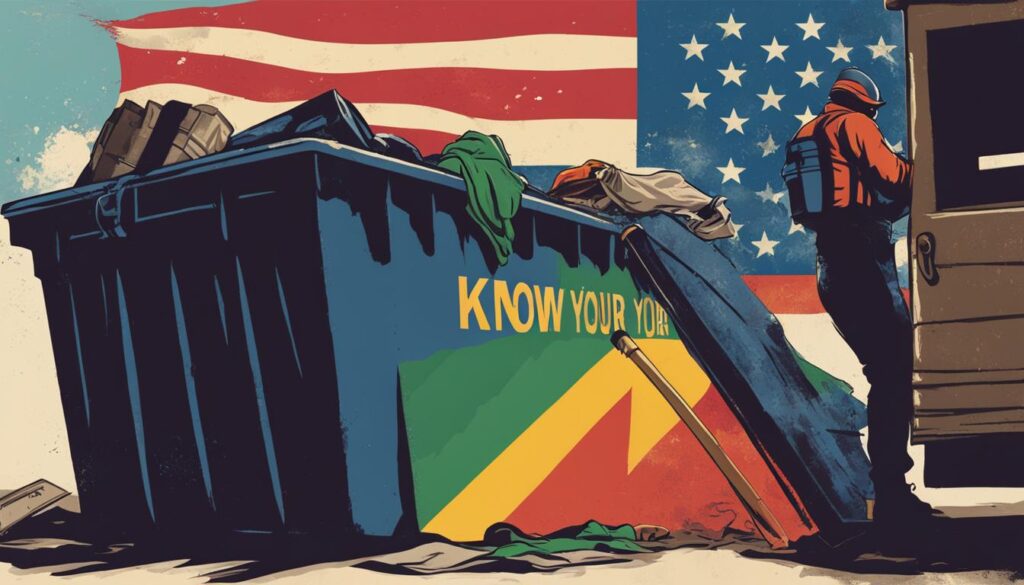
Understanding the intricacies of dumpster diving laws in Florida is essential for divers to engage in this activity responsibly and legally. By acknowledging and respecting property rights and adhering to local regulations, divers can continue to enjoy the excitement and potential rewards of dumpster diving without encountering any legal issues.
Conclusion
In conclusion, dumpster diving is legal in Florida as long as divers adhere to the state’s trespassing laws and respect private property boundaries. While there are no specific laws prohibiting dumpster diving in Florida, it is important to prioritize safety, ethics, and respect for others’ property.
To engage in dumpster diving legally in Florida, divers should familiarize themselves with the regulations and guidelines related to trespassing and private property rights. Dumpster diving can be a profitable side hustle, but it requires careful consideration of the location and an understanding of local restrictions that may apply.
By maintaining knowledge of the legality of dumpster diving in Florida and practicing responsible diving, divers can enjoy the activity while minimizing potential legal issues. Remember to stay informed about any changes to dumpster diving regulations and always prioritize safety and respect for others’ property.
Source Links
- https://bizarrehobby.com/florida-dumpster-diving/
- https://ecofriendlyfact.com/florida-dumpster-diving-laws/
- https://whatisnotlegal.com/is-dumpster-diving-illegal-in-florida/

Subscribe to Our Newsletter

